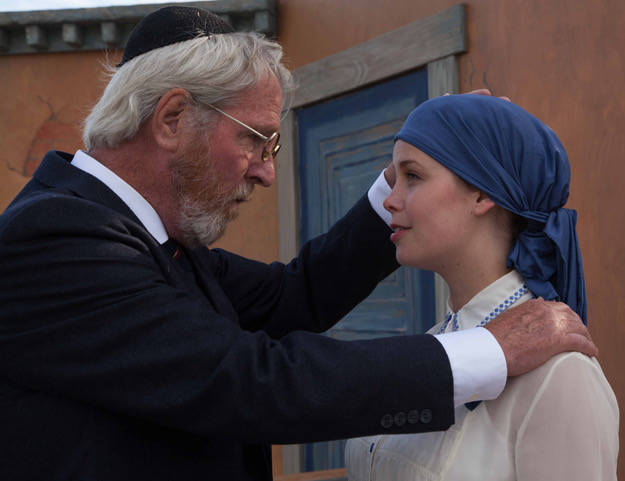Island Stage Left has been regaling islanders with Shakespeare under the stars for 21 years, and this year the play of choice is “The Merchant of Venice.”
“I think [Shakespeare] was showing us various levels of human beings and how they react,” Helen Machin-Smith, co-founder and director of Island Stage Left, said.
“The Merchant of Venice” performances will take place July 11- Aug. 11, at 1062 Wold Rd. This year, there is a new curtain time of 7:45 p.m. No latecomers, the website warns. Cost is free, but donations are welcome. Blankets are recommended, as the play is outside and evenings get chilly.
Island Stage Left’s rendition takes place in Italy in 1938, while under the rule of Mussolini. The set, designed by Susan Williams, and costumes are “gorgeous” and reflect that era, Machin-Smith said. Portia, played by Keiko Green, she added, “looks like a 1930s movie star.”
“Shakespeare was a great humanist, ” Machin-Smith said, adding that at the time the play was written, Jews were banned from England.
“Merchant of Venice” has been a controversial play, with some calling it anti-semitic. Machin-Smith said she disagrees with that assessment.
“What I hope to do with this play is put everybody in [the protagonist’s] position, imagining their way of life, their religion, and their traditions are constantly mocked, that their very livelihood is being threatened and that they are sworn at and ridiculed on the street,” she said. “Just imagine what your reaction would be.”
“Merchant” is the tale of a Jewish moneylender, Shylock — played by Daniel Mayes, co-founder of Island Stage Left — who “has been spat on, cursed, beaten and cheated for years, all because he is Jewish.”
Good friends and rich playboys Antonio, played by David Meyers, and Bassanio, played by MJ Sieber, borrow money from Shylock in order for Bassanio to woo the hand of Portia. Shylock agrees to a no-interest loan. However, should the debt fail to be repaid, he requests payment in one pound of Antonio’s flesh. Anthony agrees to the terms, and when the agreement goes sour, Shylock demands a savage enforcement of justice.
Out of the play are two of Shakespeare’s most famous speeches, one advocating tolerance and the other advocating mercy.
In the well-known quote “Hath not a Jew eyes,” Shylock says, “If you prick us, do we not bleed? If you tickle us, do we not laugh? If you poison us, do we not die?”
In advocating for mercy, Portia says, “The quality of mercy is not strain’d. It droppeth as the gentle rain from heaven. … It is twice blest; it blesseth him that gives and him that takes.”
Both speeches, Machin-Smith said, are incredibly powerful.
Like nearly every other Shakespeare play, according to Machin-Smith, “Merchant of Venice” contains modern issues and messages.
“It is all about how people see someone different from themselves and they feel threatened and react in terrible ways,” she said. The accumulative result after generations of racism becomes a boiling point, like the revenge Shylock feels toward his aggressors.
The characters themselves are also relatable Machin-Smith added.
“There is not a character in it that doesn’t have their flaws — just like us,” said said.
Despite Portia’s speech for mercy, she is by her own admission a hypocrite.
“I can easier teach twenty what were good to be done than be one of the twenty to follow mine own teaching,” she says early on in the play.
When asked if Machin-Smith was sympathetic to Shylock, Machin-Smith replied, “I am sympathetic to why Shylock is who he is.”
Good and bad, one redeeming quality all the characters share, Machin-Smith noted, is love.
Shylock loves his daughter, Antonio loves his friends and Bassanio and Portia love each other.
Also relevant to modern times, Machin-Smith added, is the argument between law and justice.
Though a drama, Merchant includes romance as well as comedy. As Island Stage Left has done for several productions, there is also music infused throughout, provided by Chiara Power, Chelsea Parrott, Patti Bair and Mark Mazzarella. Mazzarella, Machin-Smith added, sings in Italian, and has a speaking role, as does Power.
“It will be very entertaining, though some may cry during some scenes,” Machin-Smith noted.



